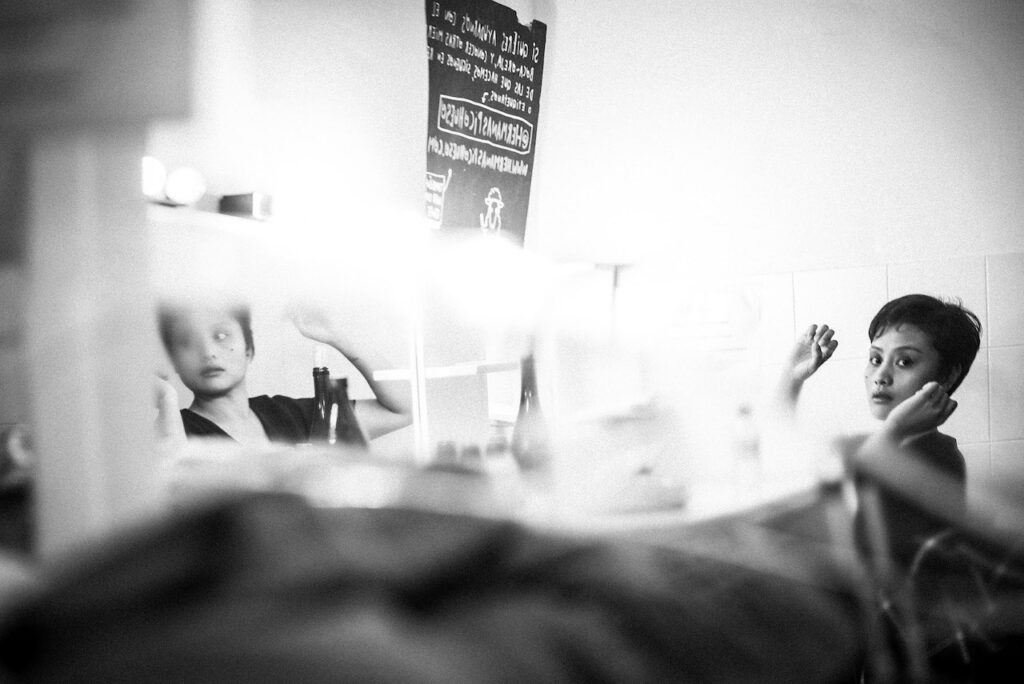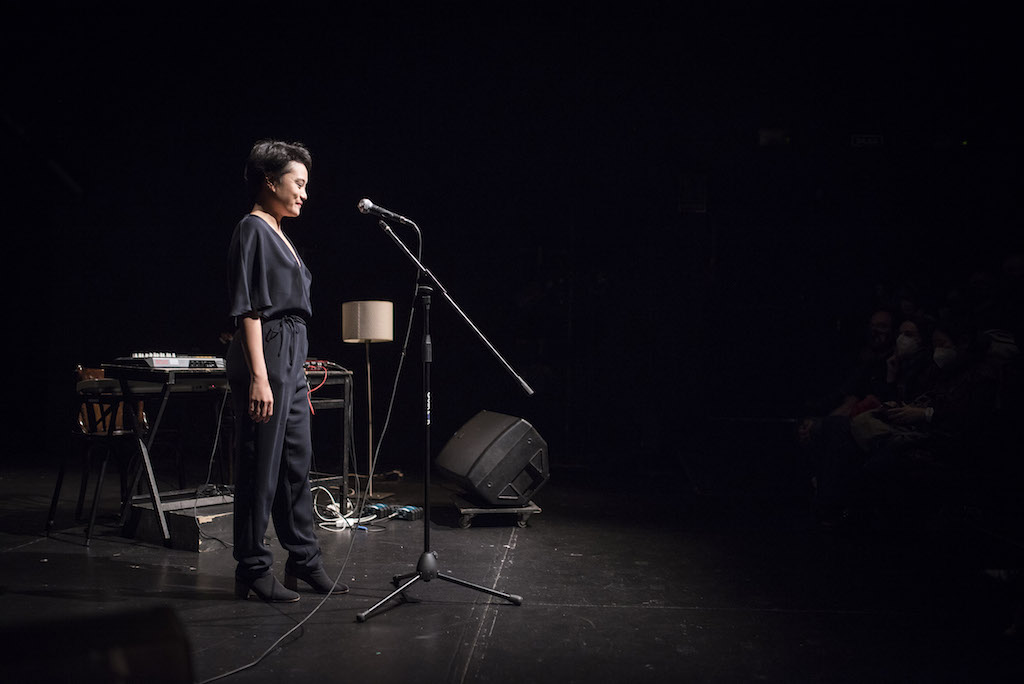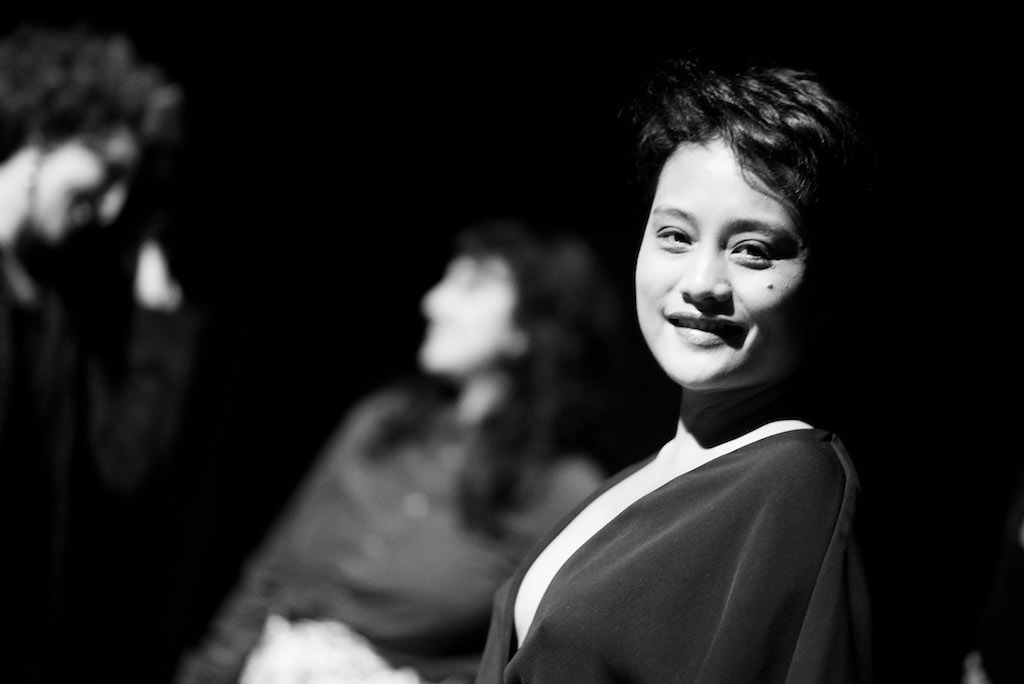Through her writings and poems, Filipina poet Karessa Ramos is breaking the language barrier for Filipino representation in Spain.
Karessa Ramos, 38, started speaking when she was only 10 months old. Due to her mother’s job in an NGO, they moved from one place to another leaving Karessa not having a stable set of friends growing up. She would talk to the plants, even to her cats, teaching them the alphabet, telling them stories. Stories that were mostly inspired by the books her mother fed her young mind. “My mom is a progressive thinker and strict. She wanted me to be independent so she gave me books. She taught me that it is okay to be alone,” explains Karessa, adding that these books made her think and love words.
We are in La Rollerie coffee shop in Madrid for a chat. Between sips of her cafe con leche, Karessa talks about her childhood “friends”. “My books had girls as protagonists. They were strong and brave characters. I wanted to be like them.” What she lacked for friends, she made up for words.
“At a young age, I built my own world through words.”

At ten, she started her diary just like her hero, Anne Frank. Her entries would mostly be in the form of a poem. She also wrote poems for her cousins. “They would hire me to write love letters and I was able to bola their girlfriends and boyfriends. They gave me siopao and sago for my service.”
Karessa wrote in her diary religiously throughout her growing up years, and only stopped at the age of 17 when she came to Spain. “My mother married my Spanish stepfather and took me to Spain against my will. I was angry. I felt robbed of words.”
Before Spain, Karessa would always sit in the first row in class, asking questions, sure of herself. In Spain, she couldn’t speak, she was muted. She also became bulimic. Then her family had to pack their bags back to the Philippines because of work, except her. “I couldn’t go because I was still in school. I was left to live in the house of my stepfather’s parents. I was helpless, I felt betrayed.”
She turned to her “friends” for comfort by reading and re-reading the books of Garcia Marquez and Isabel Allende to brush up on her Spanish. She went back to her diary and this time, her entries were in Castellano. Embracing her new life, Karessa dealt with the highs and lows of life: from finishing a degree in economics to meeting her now ex-husband, to becoming a mother, to getting out of a bad marriage, and to getting in and out a polyamorous relationship.
Lost and disappointed, Karessa found the courage from her poems to defend and accept herself. She took up creative writing in Madrid for a year.
“We don’t have representation as Filipinos, the Filipino diaspora. There is a language barrier, and I want to break it. I want to break my own fear to show we have something to give. Telling them we are also here.”
Karessa Ramos, Author and Poet

“I learned dangerous writing from Gloria Fortín. The technique is to ask myself, how would I feel if my grandmother read a risqué story of mine? If I feel uncomfortable, I have to deal with that, expand on that, dig on that.”
During the pandemic, she wrote and wrote, posting her works on Instagram. With the help of social media and the growing number of her followers, Karessa facilitated online writing workshops for Spaniards and migrants. One of her essays became part of a collection of erotic poems and short stories, Masticando el deseo, published in May 2021. In November 2021, her first book Cosechas del insomnio (Harvest from insomnia) finally came out.
While the world was asleep at night, Karessa would find herself awake searching for words to quench her thirst of letting her emotions out. Cosechas del insomnio is a product of her sleepless nights, of her childhood dreams, her teenage angst and her grown-up challenges. With the publication of her book, Karessa feels she has done something significant not only for herself but also for the migrant women.
“We don’t have representation as Filipinos, the Filipino diaspora. There is a language barrier, and I want to break it. I want to break my own fear to show we have something to give. Telling them we are also here. I cried and cried when I got hold of my book.”
Poems are a big part of Karessa’s life. And while she is still fighting her emotional battles and working very hard towards self-healing, she takes out her notebook and pen, fills each page with poems and stories that pinch the flesh and pierce through the senses. “When I finish one poem, I feel at peace, like I’m in a trance.”
Bambúes 1
De pequeña me advertían
de los tikbalang
que vivían entre bambúes.
Eran seres
mitad caballo, mitad hombres
que hechizaban a quienes
se les acercaban.
¿Cuántos caminantes perdidos
fueron encontrados
en un bosque de bambúes
con toda su ropa al revés?
¿Cuántas muchachas
despistadas
fueron halladas
en las orillas de un río,
histéricas, ahogadas con sus propias
risas?
De pequeña me iba
en busca del tikbalang.
Quería vivir entre bambúes,
ser mitad yegua, mitad humana.
Perderme,
ahogarme con risas
reidas al revés.
Mapagbakasakali
Ngayong gabi
ako’y maglalakbay.
Sasakay
sa bangkang buwan,
walang pagod
magsasagwan
upang
tawirin ang kalawakan.
Sana’y di pagalitan
ng mga nilalang
kapag namitas
doon sa langit
ng mga bituin
aking itatanim
upang
dito’y magbunga ng hiwaga.
This article was first published in TFEM’s Spring 2023 Issue
What's Your Reaction?
Nats Sisma Villaluna has been serving the Filipino community in Spain for more than 15 years. His volunteer works include teaching Spanish to Filipinos, and as artistic director of the Coro Kudyapi, a group of musically inclined young Filipinos in Barcelona. His passion to serve the Filipino community now extends to other countries in his role as Publisher and Editor-in-Chief of the new The Filipino Expat Magazine.




